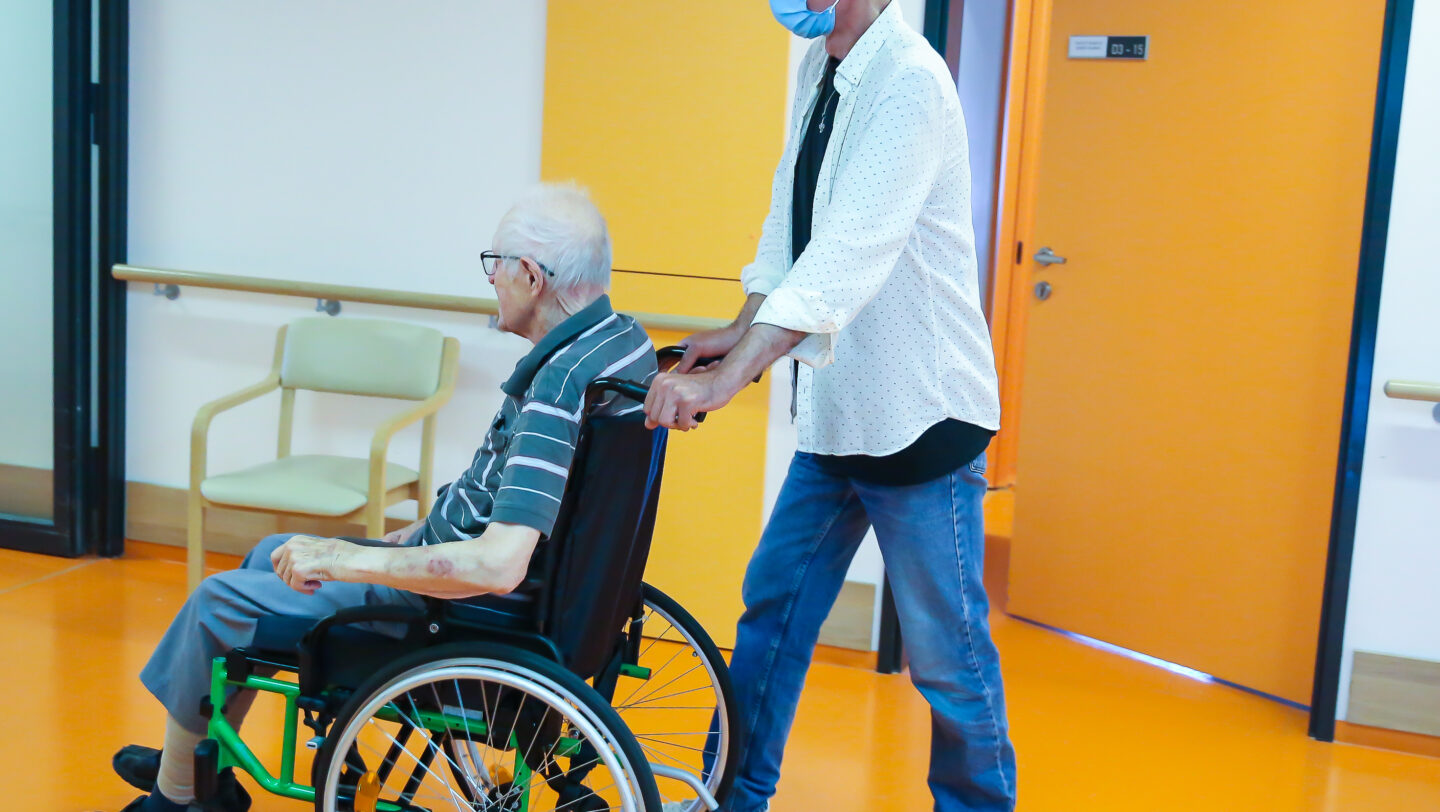Iranian asylum seeker finds his calling in caring for the elderly
Reza feels that fate has brought him to Slovenia, and to a job where he can make a difference.
Photo: UNHCR/Aleš Černivec
When Reza reached Ljubljana, his sister said it must be his fate to find a new life there. And indeed, at the mature age of 54, this intrepid Iranian has managed to learn two languages and find a possible new profession while pursuing an application for asylum in Slovenia.
Back in Tehran, Reza was an industrial designer, with his own small factory. Except for technical English, he spoke only Farsi, and he had no experience in the caring professions.
The choice was either to go back or apply for asylum on the spot. Reza’s eldest sister advised him to stay
Yet after only 22 months in Slovenia, Reza not only speaks English and Slovenian well enough to hold poetry readings but he also seems to have found his vocation, working in a home for the elderly.
“I love working with the old people,” he says. “They are like Grandma and Grandpa to me.”
Reza left three sisters behind in Tehran and set out with an initial plan to join his brother in London and seek protection there.
The journey was long. Reza spent 18 months in Bosnia and Herzegovina before crossing into Slovenia, where the authorities stopped him. The choice was either to go back or apply for asylum on the spot. Reza’s eldest sister advised him to stay.
Now I have new responsibilities. I help with the breakfasts, then we do some light movements and play games until lunch, and I help with the lunch.
“She is like a mother to me,” he says. “She said, ‘Reza, this is your fate. Don’t waste your time. Maybe this place will be good for you.’ And so, I chose to stay in Slovenia.”
Reza lives at the Kotnikova reception centre for asylum seekers in Ljubljana. Until he receives a final decision on his asylum application, he is not allowed to do paid work but he can volunteer.
“I thought to myself, ‘if you sit in this camp, you will go crazy’,” says Reza. So 18 months ago, he volunteered to work at the Elderly Centre Trnovo, a mere 10-minute bike ride from Kotnikova.
“At first I worked for two hours a day, playing games with the old people,” says Reza. “Now I have new responsibilities. I work five hours a day, every day except Sunday. I help with the breakfasts, then we do some light movements and play games until lunch, and I help with the lunch.”
Reza loves the job and has made many friends among the elderly residents.
“They wait for me,” he says. “They don’t want to do the puzzles without me. There are some over 90. When I play dominoes with them, I can’t win. The Slovenes are natural-born gamblers. You can never beat them!”
Among the residents Reza cares for are two middle-aged brothers, Janez and Miha Jakovac, both bedridden with Huntington’s disease. Their 79-year-old father Rudi visits them daily and has nothing but praise for Reza.
We are all very thankful that he comes every day and brings positive energy to us all
“He gives me both practical and moral support. I admire him. Usually, people think about themselves but Reza is warm and open, caring for others. This is rare.”
So popular is Reza with the residents that the home would like to employ him permanently. “Reza is well accepted in our centre,” says Tinkara Godec, manager of the home. “He bonds with residents on a personal level and helps them with whatever they need. We are all very thankful that he comes every day and brings positive energy to us all.”
At the same time, Reza is improving his English and Slovenian language skills at the Institute Emma, where he studies with a volunteer called Tija Jerkič. “When I was in Turkey (on the way), all I could say in English was ‘hello’ and ‘how are you?’ In one year, Tija taught me two languages.”
“Reza has a great gift for languages,” says Tija. “I can’t believe how much he has learnt in such a short time. I can’t take credit for it. It’s Reza’s will and ability to connect with people that has allowed him to use the languages daily.”
As an exercise, Reza tried to translate some verses from the Persian classics and sent them to Tia to correct. The upshot was that he translated over 50 works by poets, including Hafez and Rumi.
Then the Institute Emma, in association with the Red Cross, organised a poetry reading for him. Some poems were put up on the walls for guests to read while Reza himself recited a mixture of his own poems and his translations.
“It was a rainy winter day but about 35 people turned out,” he says. “Persian poetry is quite complex. People in the audience said they liked the poems because they made them think.”
Among the verses that Reza translated were famous quatrains by Omar Khayyám, who speaks of time, mortality and fate. In Reza’s own words:
It was a thought before the creation of the world,
Everything from good and bad was written in it,
Everything that is written in our Destiny will happen,
It is useless to be sad; it is useless to have endless dreams.
So does Reza agree with his sister that making a new life in Slovenia is his fate? “Yes,” he says, “I do not regret my choice. I feel myself that it is my fate. Because I have found a place where I am happy.”
Share on Facebook Share on Twitter







